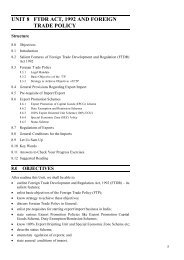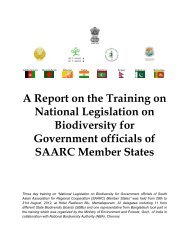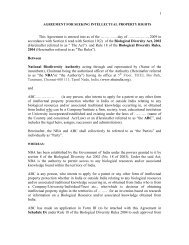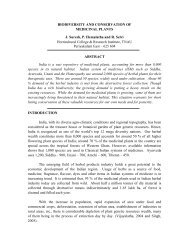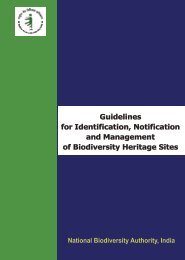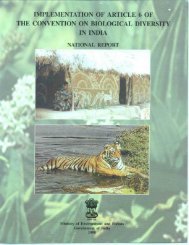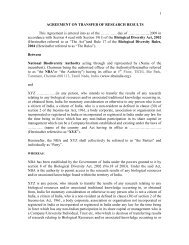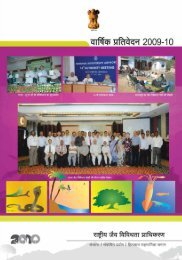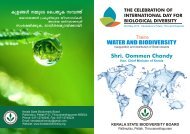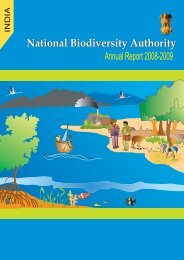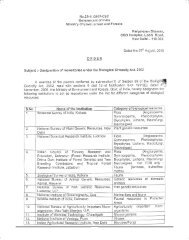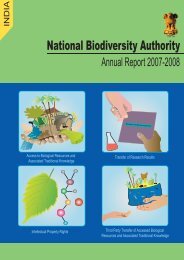BCIL BOOK.pmd - National Biodiversity Authority
BCIL BOOK.pmd - National Biodiversity Authority
BCIL BOOK.pmd - National Biodiversity Authority
You also want an ePaper? Increase the reach of your titles
YUMPU automatically turns print PDFs into web optimized ePapers that Google loves.
NATIONAL BIODIVERSITY ACTION PLAN<br />
Nearly 228 mha (69%) of geographical area of<br />
India falls under drylands (arid, semi arid and dry sub<br />
humid). These ecosystems support large human and<br />
livestock populations, contain unique genetic<br />
adaptation mechanisms for stress tolerance, and are<br />
rich in flora, fauna and microorganisms adapted to<br />
extremes of climate. The Ministry of Rural<br />
Development through its various programmes such<br />
as Integrated Wasteland Development Programme<br />
(IWDP), Drought Prone Area Programme (DPAP)<br />
and Desert Development Programme (DDP) on<br />
watershed basis, strives for development of land<br />
resources, controlling desertification, and livelihood<br />
generation with the overall objective of poverty<br />
alleviation. The Ministry has invested Rs. 6714.11<br />
crores since 1995-96 on these three programmes<br />
covering 32.40 mha in 576 districts of 28 states across<br />
the country. There is also a provision for development<br />
of forest lands forming part of watersheds through<br />
involvement of JFMCs in close coordination with the<br />
village Panchayats.<br />
Accelerated desertification processes are likely to<br />
further compound the adverse impacts of climate<br />
change. Against this backdrop, there is also a pressing<br />
need for developing tools, methodologies and<br />
indicators for assessing impacts of climate change and<br />
desertification as well as developing appropriate<br />
mitigation and adaptation strategies.<br />
Action Points<br />
Identify the key sectors of the country vulnerable<br />
to climate change, in particular impacts on water<br />
resources, agriculture, health, coastal areas and<br />
forests.<br />
Promote research to develop methodologies for<br />
tracking changes and assessing impacts of climate<br />
change on glaciers, river flows and biodiversity.<br />
Assess the need for adaptation to future impacts<br />
of climate change at national and local levels, and<br />
the scope for incorporating the outputs of such<br />
assessments in relevant programmes, including<br />
watershed management, coastal zone planning and<br />
regulation, agricultural technologies and practices,<br />
forestry management, and health programmes.<br />
Explicitly consider vulnerability of coastal areas<br />
40<br />
<br />
<br />
<br />
<br />
<br />
<br />
<br />
and their biodiversity to climate change and sealevel<br />
rise in coastal management plans, as well as<br />
infrastructure planning and construction norms.<br />
Participate in voluntary partnerships with other<br />
countries both developed and developing, to<br />
address the challenges of sustainable development<br />
and climate change, consistent with the provisions<br />
of the UNFCCC.<br />
Identify the most important gaps in knowledge<br />
that limit the national ability to develop and<br />
implement climate change adaptation strategies for<br />
species, and ecological processes and functions.<br />
Enhance the capacity of climate modeling in the<br />
country substantially to get clear idea on the<br />
impacts of climate change on biodiversity at<br />
national and local levels.<br />
Develop ecological criteria for identifying the<br />
species and ecosystems that are at great risk from<br />
climate change and identify their priority habitats.<br />
Identify information requirements and priorities,<br />
through expert consultative processes, for longterm<br />
monitoring of climate change impacts on<br />
biodiversity.<br />
Establish a climate change and biodiversity website<br />
for decision makers concerned with national<br />
resource management to facilitate information<br />
exchange about the actual and potential impacts<br />
of climate change and relevant policies, strategies<br />
and programmes.<br />
In view of the multidisciplinary nature of the<br />
subject, undertake an ‘All India Coordinated



